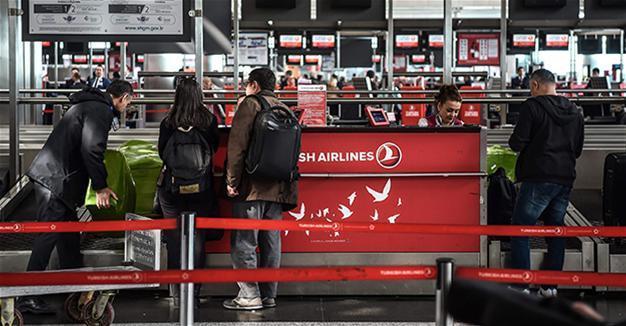Turkish gov’t asks US to be out of flight ban list
ANKARA

AFP photo
Turkey sent a letter to the United States demanding its removal from a group of eight countries that are subject to a ban preventing aircraft passengers from bringing electronic devices larger than a cellphone with them as carry-on luggage, one day after Britain joined the U.S. in tightening airline security on flights from Turkey, the Middle East and North Africa.Turkish Transportation, Maritime Affairs and Communications Minister Ahmet Arslan said that he had penned a letter to his U.S. counterpart, requesting that Turkey’s biggest airport, Atatürk International Airport in Istanbul, be taken off the list of hubs which are subject to the U.S. electronics ban.
“I have sent a letter to my counterpart in the U.S., which took an electronic devices decision regarding Turkey,” he said on March 22.
Arslan said he would also send a letter to his counterpart in the U.K. that took a similar decision to the one the U.S. took just hours after the latter’s announcement.
Passengers flying directly to Britain from six countries – Turkey, Egypt, Jordan, Lebanon, Saudi Arabia, Tunisia – will be required to place laptops and tablet computers and large phones into hold luggage, a government spokesman said on March 21, according to AFP.
“The additional security measures may cause some disruption for passengers and flights, and we understand the frustration that will cause, but our top priority will always be to maintain the safety of British nationals,” he said in a statement.
The move came hours after the U.S. government warned that extremists plan to target passenger jets with bombs hidden in electronic devices, and banned carrying them in cabins on flights from 10 airports in eight countries.
The British ban only involves six countries, two of which – Lebanon and Tunisia – do not feature on the U.S. list. Kuwait, Morocco, Qatar and United Arab Emirates are on the U.S. list, but not the British one.
“We have been in close touch with the Americans to fully understand their position,” the spokesman said.
The British ban specified that it would apply to devices bigger than 16 centimeters in length, 9.3 cm in width and 1.5 cm thick – smaller than some e-readers like Kindles.
The British ban affects six British airlines, including charters – British Airways, EasyJet, Jet2.com, Monarch, Thomas Cook and Thomson.
It also impacts eight foreign carriers, including Egyptair, Royal Jordanian, Tunis Air and Turkish Airlines.
Canadian and French officials are considering whether to impose similar measures, but Germany, Australia and New Zealand said they are not currently mulling a ban.
A Downing Street spokesman said on March 22 that the British ban would be introduced “in the coming days.”
The government told the domestic Press Association news agency on March 22 that it had immediately informed the 14 airlines impacted by the new measure, but that it would be introduced “in the coming days.”
“We are working with the airlines,” a Downing Street spokesman confirmed to AFP, adding that “passengers should contact their airlines to find out if it applied to them.”
However, no mention was made as to when the new measure would come into effect.
When contacted by AFP, British Airways, one of the airlines affected by the new measure, said it was up to the government to communicate on the issue.
















